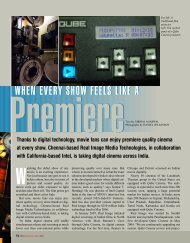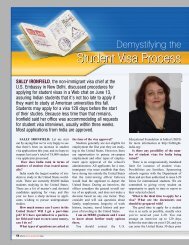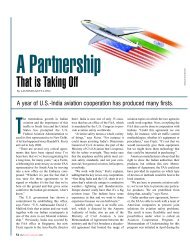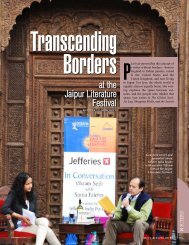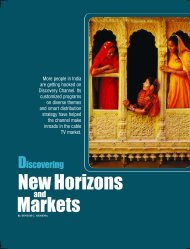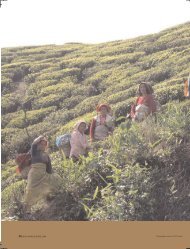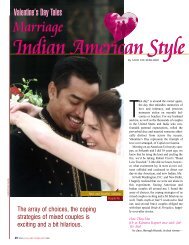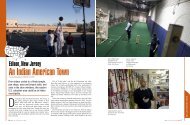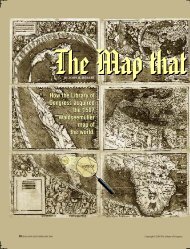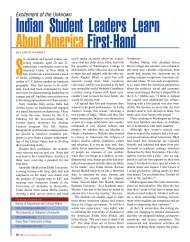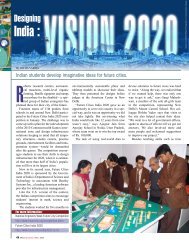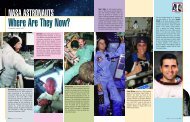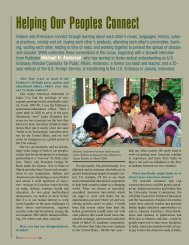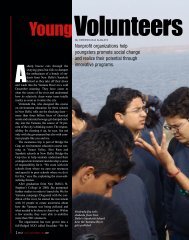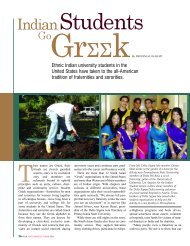You also want an ePaper? Increase the reach of your titles
YUMPU automatically turns print PDFs into web optimized ePapers that Google loves.
ADNAN SIDDIQI<br />
U<br />
.S. government-funded<br />
Fulbright scholarships,<br />
which bring people from<br />
other nations to study at<br />
<strong>American</strong> universities and<br />
send <strong>American</strong> scholars<br />
abroad, have played a role in<br />
the family histories of many of<br />
the <strong>American</strong> officers in India.<br />
For ADNAN SIDDIQI, the<br />
U.S. Counselor for Cultural<br />
Affairs, the story has come full<br />
circle. It was a Fulbright that<br />
brought his Indian-born father<br />
to the United States from<br />
Pakistan in the 1960s. Now<br />
Siddiqi is chairman of the<br />
board of USEFI (the United<br />
States Education Foundation in<br />
India), which administers the<br />
“I feel connected to<br />
both countries,<br />
India and Pakistan.<br />
It was all one<br />
country.”<br />
Above: The 1946 photo of<br />
his father and grandfather<br />
in Adnan Siddiqi’s office.<br />
Right: Anis Ahmad Siddiqi<br />
of New York, visiting his<br />
granddaughter, Nilofer, 5,<br />
and son Adnan Siddiqi in<br />
New Delhi.<br />
42 SPAN SEPTEMBER/OCTOBER 2005<br />
Fulbrights, providing opportunities<br />
to others.<br />
On Siddiqi’s office wall at<br />
the <strong>American</strong> Center in New<br />
Delhi is an old photograph of<br />
his father, Anis Ahmad, as a<br />
boy, and grandfather, Hafiz<br />
Muhammad Siddiq, among<br />
other British and Indian<br />
government officers at the Red<br />
Fort in 1946. Anis, born in<br />
Kanpur, earned his law degree<br />
from Aligarh Muslim University,<br />
moved to Karachi where<br />
he married Delhi native Qamar<br />
Sultana Mirza, and in 1959<br />
Adnan Siddiqi was born.<br />
Siddiqi was just four when he<br />
and his mother joined Anis,<br />
who was studying at Columbia<br />
University Law School in New<br />
York as a Fulbrighter.<br />
“Now you have large Asian<br />
<strong>American</strong> communities. Then,<br />
there were just a handful,” says<br />
Siddiqi, who felt isolated and<br />
different growing up. “My first<br />
school was a nursery school in<br />
a church. In junior high I went<br />
to a Catholic school, because<br />
the standards were higher.”<br />
After six years in New York,<br />
his parents felt Siddiqi and<br />
his U.S.-born brothers “were<br />
getting too <strong>American</strong>ized.”<br />
The boys and their mother<br />
went back to Pakistan. “I<br />
remember being reduced to<br />
tears the first time I took an<br />
Urdu test for school. I couldn’t<br />
even understand the question,”<br />
says Siddiqi, who had used a<br />
more colloquial version of the<br />
language at home in New<br />
York. He later studied Hindi at<br />
university and practiced by<br />
writing letters to relatives in<br />
India. Now both languages<br />
“make it much easier for me to<br />
make friends. People are more<br />
frank with me,” he says.<br />
In Karachi, Siddiqi learned to<br />
play cricket, enjoyed flying<br />
kites, something kids in New<br />
York City don’t do, and was a<br />
celebrity among his neighbors<br />
because of his strange-looking<br />
<strong>American</strong> “barracuda” bicycle.<br />
The family was undecided about<br />
whether to emigrate permanently,<br />
but living through the 1970-<br />
71 India-Pakistan War settled the<br />
question. They returned to the<br />
United States after just two years<br />
in Pakistan. In 1980 Siddiqi,<br />
then 19, joined his parents in<br />
becoming citizens. “I didn’t<br />
think it would be an emotional<br />
thing until I was asked to give up<br />
all ties to the region,” he says. “I<br />
looked around the room at these<br />
other people doing the same<br />
thing. But it took a couple of<br />
years until I started feeling<br />
<strong>American</strong>.”<br />
During undergraduate study<br />
at Columbia College he joined<br />
the India Club and, as a hobby,<br />
tried his hand at translating<br />
Mirza Asadullah Khan<br />
Ghalib’s poetry into English. “I<br />
thought it was a way to bring<br />
the cultures together,” he<br />
says. “It wasn’t published or<br />
appreciated.” Siddiqi earned a<br />
master’s degree in international<br />
relations from Columbia University.<br />
But he hit the job



